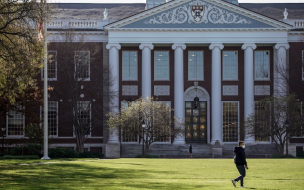Northwestern University's Kellogg School of Management offers one of the most prestigious MBA programs in the USA, sitting in the top 10 of MBA rankings listed by the Financial Times, Bloomberg, and US News.
One of the program’s strengths is the diversity of disciplines students can specialize in. As well as offering numerous majors, including accounting, marketing, strategy, and managing organizations, the school provides “pathways” for students to explore evolving industries. These give students deeper insight into areas like data analytics, venture capital, and social impact.
The results speak for themselves. Data for the most recent graduating class shows that students secured a record-high median salary of $175,000. Alumni accepted roles in the 'Big Three' MBA industries of consulting, tech, and finance, as well as others including consumer packaged goods and healthcare.
Hoping this could be you in the future? You need to understand the kind of students that make it onto the Kellogg MBA to present a competitive application. We’ve broken down the Kellogg MBA class profile for the class of 2026 to give you an idea.

Kellogg MBA Class of 2026 | Overview
The Kellogg MBA class of 2025 comprises 524 professionals from varying backgrounds. This may sound like a lot of people, but with some top MBAs approaching 1,000 students, the Kellogg class strikes a balance between breadth and depth of networking potential.
Of these 524 students, 50% are female—which is the first time in Kellogg MBA history that the program has achieved gender balance. It is currently the only M7 business school to have an even split of men and women in its MBA program. The program also has strong LGBTQ+ representation at 11% of enrolled MBA students.
In addition to offering diversity when it comes to gender and sexuality, the Kellogg MBA class also offers international diversity, as 40% of the cohort are from outside the US.
Of the students that hail from within the US, 33% belong to underrepresented minorities. In total, 10% of the class are first-generation students—a slight drop from the last intake.
Kellogg MBA | GMAT Scores
A strong score on the Graduate Management Admission Test (GMAT) is a great addition to any MBA application. At top-ranked schools that receive hundreds, if not thousands, of applications each year, this can become a site of real competition for applicants.
The MBA at Kellogg School of Management is no different. Like the classes of many top programs, the Kellogg MBA class of 2026 scored exceptionally well on the GMAT. However, as of 2024, GMAT scoring has changed as part of a new iteration of the test, meaning top GMAT scores now look different to previous years.
Under the previous scoring convention, the average GMAT score for the Class of 2026 was 731, which would place the typical average student in the 95th percentile. That means the average Kellogg MBA student performed better than 95% of test-takers on the GMAT. Under the current scoring system, a GMAT score in the 95th percentile will now be more or less equivalent to 675.
A score in the 95th percentile might sound intimidating, but don’t worry. Your GMAT score is not the only thing that can help you stand out in an MBA application. Admissions directors also want to see experience and drive, neither of which are showcased by standardized testing.
This is why the overall range of GMAT scores for the Kellogg MBA Class of 2026 included applicants at the lower end who would only be performing in the top 40% of test-takers. It’s highly likely that they showcased other desirable attributes in the rest of their application, for example, their MBA admissions essays.
Kellogg MBA | Undergraduate majors & GPA
We’ve seen that the Kellogg MBA class generally performs well on the GMAT. They are also an academically impressive group of people who come to the MBA from a range of undergraduate majors.
Half of the cohort studied economics or business at the undergraduate level, and over a third (39%) came to the school after studying STEM subjects—that’s science, technology, engineering, and math.
That may not sound like a recipe for academic diversity, but almost a quarter (24%) of students studied humanities at college—a high percentage for business students.
(If you’re confused about the percentages, that’s because double majors were counted in both categories—another testament to the diverse disciplines on display in the Kellogg MBA class profile.)
Kellogg MBA | Work experience & target industries
Like most MBA programs, the Kellogg MBA targets professionals in their early-to mid-careers, with the average student coming into the program after five years in the workforce.
The Kellogg MBA also reflects broader trends in the industries that students are targeting after graduation. Almost a third (32%) desire careers in consulting, which is a 6% jump from the year before. Consulting is closely followed by technology and financial services, which each account for 18% of students.
The next most popular industries that Kellogg MBAs aspire to are healthcare and biopharma (7%), consumer products (5%), and media and entertainment (5%).

Although the Kellogg MBA follows the patterns of many MBA programs when it comes to career outcomes, with the 'Big Three' MBA industries of finance, tech, and consulting taking the top spots, this is a leading MBA to target for professionals of all backgrounds.
As well as enrolling a diverse crop of students in terms of gender, sexuality, and race, the school also ensures the cohort is diverse in terms of academic backgrounds and career goals. It facilitates these outcomes by providing a wealth of specialization options as part of the curriculum.
Applicants would do well to study up on the GMAT as Kellogg MBAs typically perform strongly here. However, the range of scores represented by the class suggests that applicants without a sky-high standardized test score shouldn’t be discouraged.
If you can showcase your unique background and how the Kellogg MBA fits into your overall career trajectory, you have a good chance of making it into the class.









